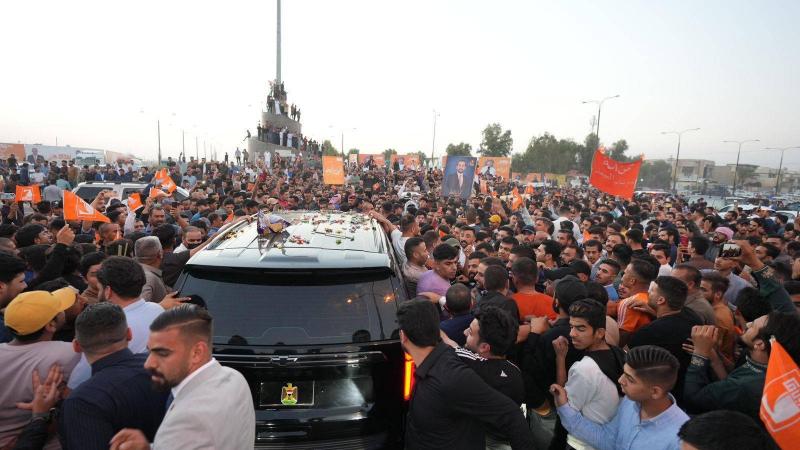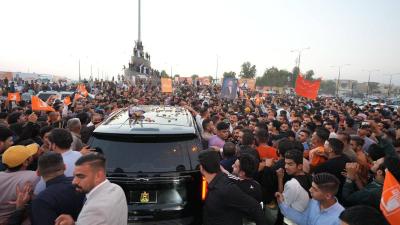Mohammed al-Halbusi, the ousted Iraqi Parliament Speaker, returned to Fallujah, one of his strongholds and near his birthplace (Al-Suqalawiya), carried on the shoulders of supporters. More than 15,000 people gathered in hundreds of vehicles and on foot at the entrance of Fallujah, near the Iraqi capital Baghdad (50 km west), waiting for al-Halbusi's convoy. Upon his arrival, al-Halbusi affirmed that no one can be allowed to violate the constitution or the law. During his reception by the crowds in the Al-Karma district, he stated, "We are responsible for you and we want you to maintain security and stability in your city and governorate and not allow anyone to tamper with its security and stability." Al-Halbusi added, "Don’t worry; this is our problem, and we will resolve it, and we will not permit anyone to infringe upon the law and the constitution," stressing that "what we want from you is to preserve security and stability and to build, and rest assured that the matter will be addressed, and my capital is these people, the audience, and the public, and we come to our lands with our heads held high."
While opinions and positions remain varied among political and legal circles in Iraq regarding what happened to al-Halbusi and whether it was a political targeting or an independent judicial decision following a proven forgery incident, views within these circles also differ regarding the jurisdiction of the Federal Court, which has not addressed Article 93 of the constitution in the cases relied upon by the Federal Supreme Court in its ruling against al-Halbusi, arguing that forgery cases fall under the jurisdiction of penal courts and not the Federal Supreme Court, which is tasked with interpreting the constitution. Since the position of the parliament presidency is allocated to the Sunni component, the disagreement, which has become clearer four days post-ruling, is now within the Sunni component itself.
While the "Taqaddum" party, led by al-Halbusi, maintains the majority of seats in the Iraqi parliament among Sunni forces, the disputes within the Sunni house have started to escalate not only about who will succeed al-Halbusi but also about the mechanism through which a new parliament president will be chosen. In this context, according to a Sunni MP, there is a desire among many Sunni parties to delay the selection of al-Halbusi's replacement until after the provincial council elections at the end of next month.
A Sunni MP spoke to "Asharq Al-Awsat," requesting anonymity and not disclosing his affiliated bloc, stating that "several figures from different Sunni blocs have begun to compete for the position of parliament president, even from within the bloc led by al-Halbusi (Taqaddum)." He added that "there is a viewpoint within Sunni circles advocating against rushing to select al-Halbusi's replacement now, especially as everyone prepares for local elections, particularly after the main blocs recently agreed, specifically the (Coordination Framework) and (State Administration), to hold them on schedule despite the Federal Court's decision and Sadr's call for his supporters to boycott them in order not to confuse the scene further, especially within the Sunni house." He noted that "the most suitable solution now is for the first deputy speaker of parliament to manage its sessions until after the local elections, especially since there are not many sessions at this time."
However, there is pressure from those relying on the parliament's internal regulations that state that following the vacancy of the parliament president's position, nominations should be opened for anyone wishing to hold this position. Although this procedure is formally correct, it is practically implausible since the position is exclusively reserved for the Sunnis, thus requiring internal Sunni consensus before presenting an alternative candidate. Nevertheless, irrespective of the mechanisms and formalities related to choosing a substitute, a crisis has begun to crystallize, albeit still silent, regarding al-Halbusi's succession, but perspectives are beginning to surface regarding whether the candidate to succeed al-Halbusi will be from his own party "Taqaddum" or from any other Sunni party or bloc.
Furthermore, even if an agreement is reached on any alternative to al-Halbusi from within the Sunni house, the new replacement must secure political agreement from other parties, especially the Shiites and Kurds. While the Kurds do not appear to have issues regarding who succeeds al-Halbusi from the Sunni house, many Shiite forces and parties have conditions for the new parliament president, indicating the emergence of new alignments that could alter the political game in Iraq. This would impose political obligations and perhaps conditions on the new candidate, placing the Sunni house in a challenging position, particularly if it fails to defend its most critical sovereign entitlement, which is the presidency of the parliament.




